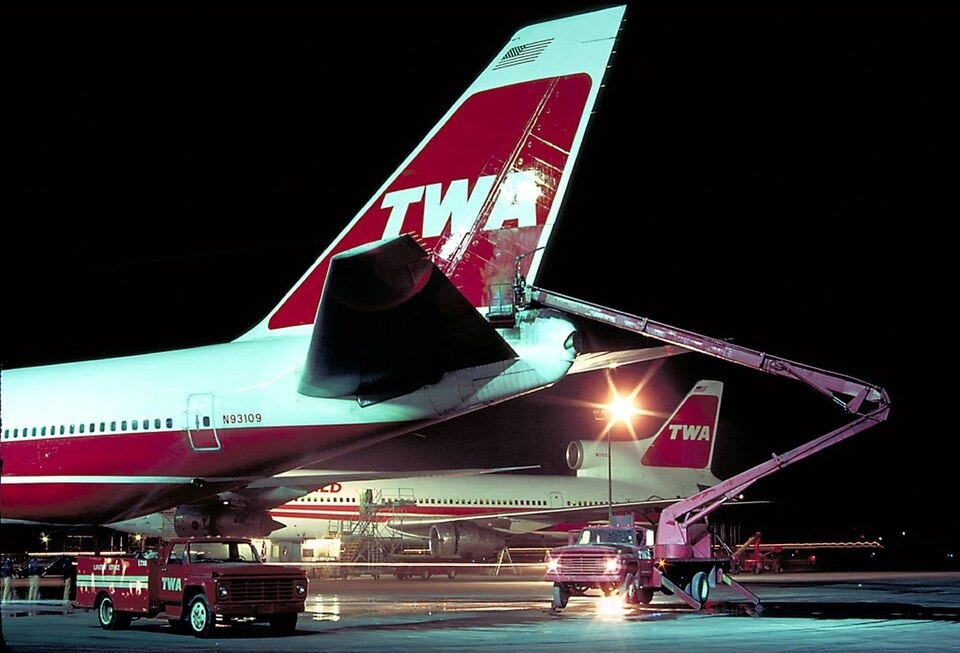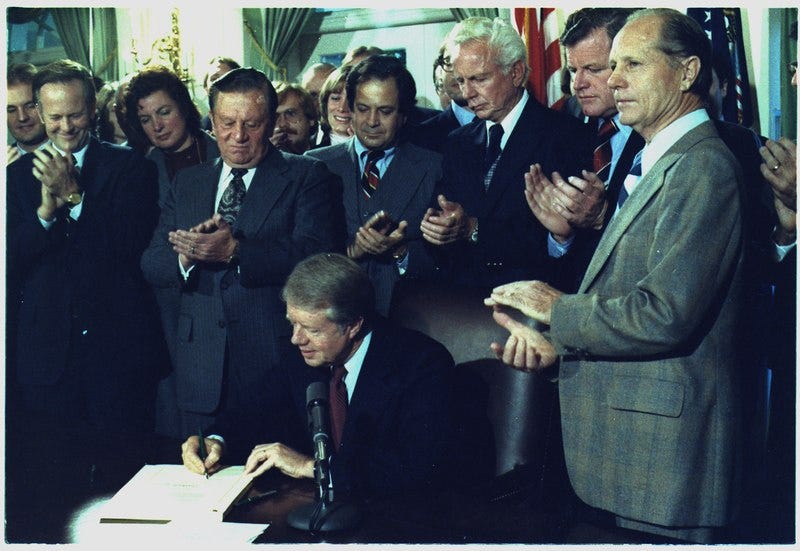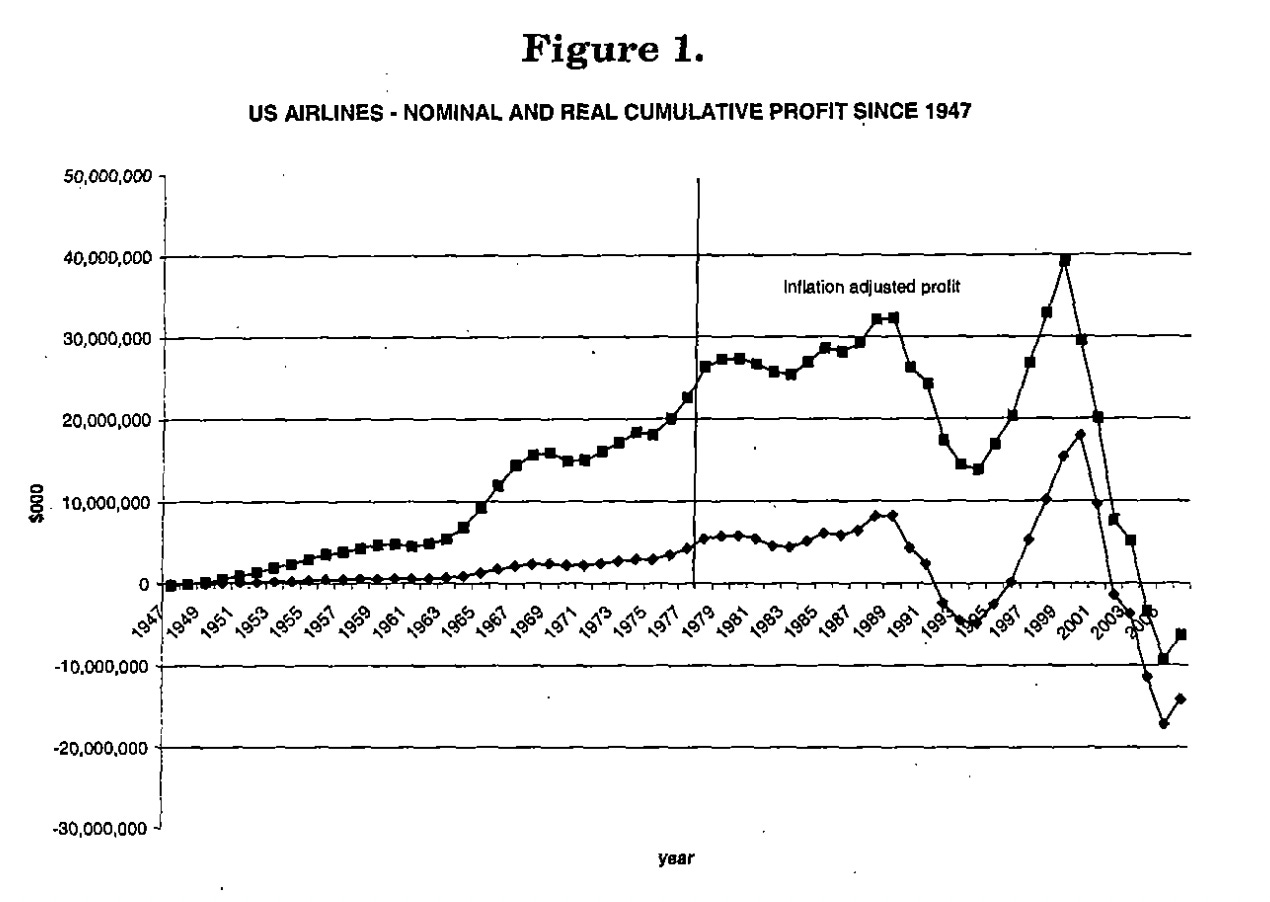Neoliberalism Takes Flight
How neoliberal economic policy was ushered in through the American airline industry.

Some decades ago, my grandpa worked as an airplane engineer for Trans World Airlines (TWA) at John F. Kennedy International Airport. He helped maintain aircrafts for what was once one of the “Big Four” airlines in the United States. TWA, along with American, Eastern, and United Airlines, were the four airlines that dominated the country’s skies for much of the 20th century. If you had to catch a flight at JFK back in the day, chances are you were boarding a TWA plane.
Obviously, there is no more TWA today. After years of financial struggle, the airline would be bought out by American Airlines in 2001. While TWA surely isn’t the only airline that has come and gone over the years, its story does shed light on how neoliberal economic policies completely reshaped both the airline industry and the U.S. economy as a whole. Indeed, “TWA's fortunes began to dim in the 1980s in the wake of deregulation of the commercial aviation industry.”1
Ah yes, the 80s. The best of Star Wars, the rise of Nintendo, and of course, the decade of Ronald Reagan. Yet, it actually wasn’t President Reagan who oversaw the initial deregulation of the airline industry. It was in fact Jimmy Carter who signed the 1978 Airline Deregulation Act into law, completely reshaping air travel in the United States. In signing this act, Carter set the stage for a major shift in America’s mainstream economic policy. Specifically, he formally set the foundation for something called neoliberalism.

Neoliberalism is a term that sure gets thrown around a lot these days. Maybe you’ve heard of it before, maybe not. You obviously see the word “liberal” in it. However, the ideology of neoliberalism is the exact opposite of the liberal economic policies that shaped programs such as Franklin D. Roosevelt’s New Deal. While the liberal economic policies of FDR’s New Deal expanded regulation following the Great Depression, neoliberalism sought to undo this by reducing government intervention in markets. Many have tried developing a clear definition of neoliberalism, but we’ll use Investopedia for the sake of simplicity:
Neoliberalism is a policy model that encompasses both politics and economics. It favors private enterprise and seeks to transfer the control of economic factors from the government to the private sector.
Many neoliberal policies concern the efficient functioning of free market capitalism and focus on limiting government spending, government regulation, and public ownership.2
Carter’s deregulation of the airline industry certainly lived up to this definition. According to the U.S. Department of Transportation’s official website, “The Airline Deregulation Act (ADA), passed in 1978, removed federal control over such areas as fares, routes, and market entry of new airlines.”3 Simply put, the main goal of this legislation was to foster a more competitive airline industry through reducing public oversight. The ADA also led to the elimination of an agency known as the Civil Aeronautics Board (CAB) in 1984, which was directly “…involved in setting interstate routes as well as regulating fares for the commercial airlines.”4 Ticket prices, routes, and air travel quality would now be regulated by the “free market” instead of the federal government.5
Yet, despite the promise of a more efficient airline industry, the initial impact of deregulation actually exposed how poorly prepared airline executives were. According to industry researcher Mark M. Walker,
“For many years, the airlines preferred to pay the costs of CAB regulation rather than face the uncertain environment that would exist without controls. Once the industry was deregulated, however, many carriers were lured by the freedom to expand and increase market share. The result was that many airlines overexpanded, faced overcapacity, and therefore had to sell their product at low prices, suffering declining profits as a result.”6
Seeking greater profit margins and an expanded market share, airliners would attempt to exploit the new era of deregulation. Yet, their ambitious efforts to dominate the skies backfired. TWA is a prime example of one such airline that attempted to expand and ultimately ended up collapsing. As explained by the online aviation publication Simple Flying, “…following deregulation, TWA failed to expand domestically… [selling] off many of its profitable assets.”7
The new market force of neoliberalism was indeed quite magical, helping make one of America’s greatest airlines disappear before our very eyes. Although other internal issues plagued TWA, neoliberalism set the very economic conditions that ultimately contributed to its demise in the early 2000s.
Air travel started costing extra
Probably the most frustrating thing passengers experience on flights today are the extra costs and fees. It often feels like you are just paying more for less. Well, you can once again thank neoliberalism for this phenomenon. Industry analyst Henry Harteveldt at Atmosphere Research Group explained this development to Marketplace.org, stating that airlines would compete on something called the “soft product.” These “soft products” were the piano bars, the fancy lounges, the unlimited alcohol, and of course, the free dinners. Harteveldt explained that since airlines were deregulated, “…they have competed almost entirely on price, gradually spinning out every amenity as an extra, from checked baggage to sitting with your kids.”8
Of course, it makes sense from an economic standpoint. Deregulation promoted fiercer price competition, which meant airlines were competing to offer the lowest fares possible and would need to reduce expenses to achieve such a low-cost business model. Many have credited deregulation for driving down ticket prices, arguing it made flying more accessible as a whole even if some former amenities were cut. While it is true that airfare has certainly declined since deregulation, a deeper analysis reveals that this was actually already the case as early as the 1960s. This is supported by price data from a March 2000 U.S. Bureau of Labor Statistics report, outlined in the graph below:

In fact, some analysts even argue that deregulation may have actually slowed down the decline in airfare. Professor Paul Dempsey of the McGill University Institute of Air & Space Law, explained the following in one 1990 Economic Policy Institute report:
“…real fares net of fuel trended downward prior to deregulation at 2.7 percent a year, and consumers in 1988 paid the same real yield net-of-fuel they would have paid had the pre-deregulation trend continued, it follows that in 1989 consumers [were] estimated to be paying roughly 2.6 percent more than they would be paying under the pre-deregulation trend per mile…”9
Not to mention, even if airfares were declining, we shouldn’t forget about the newly added fees that have emerged. Harvard Law Today interviewed Vanderbilt Law Professor Ganesh Sitaraman on this very issue:
“Over the last few decades, we’ve seen pricing get more and more complicated with increasing numbers of fares and classes of fares, in addition to all the junk fees and additional prices and costs that are added to tickets now. I think passengers need a much simpler system that’s easier for people to understand…”10
Clearly, there is an argument to be made that deregulation left consumers worse off. I’ll bet many of you reading can share anecdotally how unaffordable flying has become despite the promised prosperity of neoliberalism. And, in addition to consumers, the airlines themselves were also suffering financially. This phenomenon wasn’t just associated with TWA.
Deregulation was bad for business too
Neoliberal economic reforms not only hurt consumers, but were also bad for business. The brutal market competition that followed deregulation promoted a destabilizing business cycle where profitability significantly declined. A 2008 financial analysis of the airline industry proves this. While acknowledging that the first decade of deregulation generated a modest profit of more than $400 billion, net losses totaled $14 billion in the ensuing five years, eventually reaching a debt burden of $35 billion by the mid 1990s.11 Some of these profits would be recovered going into the early 2000s, but airlines would experience financial losses again by 2005, as observed in the table from the report below.
The American Economic Liberties Project perhaps explained it best:
“Under deregulation, the airlines have not even been a profitable industry. Regulation is not meant to cap prices and push fares even lower, but rather to set reasonable fares that would prevent a high-fixed-cost industry, like airlines, from falling into cycles of price wars, bankruptcies, and consolidations.”12
As a result of this boom-and-bust cycle, the airline industry far too often relies on the American taxpayer to save it. Professor Sitaraman emphasized this issue to Harvard Law Review, stating, “The industry is in a boom-and-bust cycle in which it makes tons of money, and then, when there’s a demand shock, like 9/11 or COVID, it needs a taxpayer bailout or support program.”13
It’s time to move on from neoliberalism
So, there you have it. One 1978 law that completely restructured the airline industry ushered in the era of economic neoliberalism. Started by Carter, cemented by Reagan, and continued by both Bushes, Clinton, and Obama.
Neoliberal economic policy has not only failed the industry, but also consumers and the taxpayer. We need a stable, affordable, and safe airline industry to ensure that air travel can be a public good. This also applies to the U.S. economy as a whole, where neoliberal policies have gutted communities across the country. In analyzing the case study of the American airline industry, we are again reminded how neoliberalism has been a policy failure.
https://truthout.org/articles/neoliberal-policies-associated-with-reaganomics-actually-started-with-carter/
https://www.investopedia.com/terms/n/neoliberalism.asp
https://www.transportation.gov/policy/aviation-policy/small-community-rural-air-service/essential-air-service
https://www.britannica.com/money/interstate-commerce-United-States-law#ref153437
https://www.ebsco.com/research-starters/history/deregulation-us-airline-industry
Ibid.
https://simpleflying.com/twa-1992-bankruptcy-filing-explanation/
https://www.marketplace.org/2024/06/04/air-travel-wasnt-always-so-miserable-or-so-cheap/
https://files.epi.org/2014/flying-blind.pdf. Page 35.
https://hls.harvard.edu/today/airline-deregulation-may-be-why-flying-is-such-a-miserable-part-of-holiday-travel/
https://www.mcgill.ca/iasl/files/iasl/ASPL614_Industry_PostDeregulation-Houston.pdf
https://www.economicliberties.us/media/regulate/
https://hls.harvard.edu/today/airline-deregulation-may-be-why-flying-is-such-a-miserable-part-of-holiday-travel/




